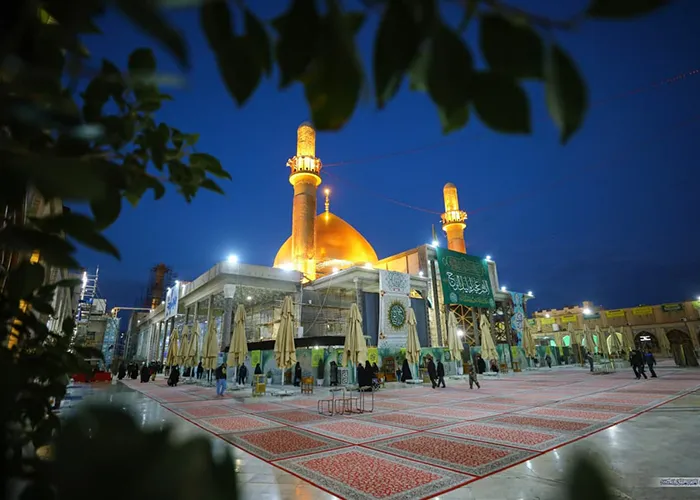Fatwa Panel of the Week – Volume02 Issue34
Rulings on Adhān and Iqāmah
According to the fatwas of the Grand Marājiʿ: Grand Ayatollah Khamenei, Grand Ayatollah Sistani, and Grand Ayatollah Makarem Shirazi (may their shade be extended)
The Recommendation of Adhān and Iqāmah Before the Daily Obligatory Prayers
| Ayatollah Khamenei | Ayatollah Sistani | Ayatollah Makarem Shirazi |
|---|---|---|
| 1. It is recommended to say the Adhān and Iqāmah before the daily obligatory prayers. This recommendation is especially emphasized for the Fajr and Maghrib prayers, particularly in congregational prayers.
2. During Iqāmah, it is recommended that the body remains still, it be recited softer than Adhān, and the phrases not be said in a rushed or merged way, but shorter pauses than Adhān are allowed. 3. The Phrases of Adhān (Call to Prayer) The Phrases of Iqāmah (Call to Begin Prayer) The final “Lā ilāha illallāh” is said once It is recommended to sit for a while, or perform a prostration, or recite tasbīḥ, or remain silent, or speak briefly, or pray two units (rakʿahs) between Adhān and Iqāmah. |
1. Same as Ayatollah Khamenei’s Fatwa.
2. Same as Ayatollah Khamenei’s Fatwa. 3. Same as Ayatollah Khamenei’s Fatwa. |
1. Same as Ayatollah Khamenei’s Fatwa.
2. Same as Ayatollah Khamenei’s Fatwa. 3. Same as Ayatollah Khamenei’s Fatwa. |
Ruling on Saying “Ashhadu anna ʿAliyyan Walīyyullāh” in Adhān and Iqāmah
| Ayatollah Khamenei | Ayatollah Sistani | Ayatollah Makarem Shirazi |
|---|---|---|
| 1. Saying “Ashhadu anna ʿAliyyan Walīyyullāh” as a Shīʿī slogan is good and important, but it is not a part of the Adhān and Iqāmah. It should be said with the intention of general devotion (Qurbatan Ilā Allāh). | 1. Same as Ayatollah Khamenei’s Fatwa. | 1. Same as Ayatollah Khamenei’s Fatwa. |
Note: The Meaning of “Intention of General Devotion (Qasd al-Qurbah al-Mutlaqah)”
The term Qasd al-Qurbah al-Mutlaqah means that a person performs an action solely with the intention of seeking closeness to Allah, without specifying in their intention whether the act is obligatory (wājib), recommended (mustahabb), or any other particular designation.
Example:
Suppose someone wants to perform a two-unit (rakʿah) prayer.
- If they say: “I am performing the obligatory Fajr prayer, seeking nearness to Allah” → This is a specific devotional intention (qasd al-qurbah al-muʿayyanah), because they have specified both the type (i.e., obligatory) and the title of the act (i.e., Fajr prayer).
- But if they simply intend: “I am performing two rakʿahs of prayer, seeking nearness to Allah”, without associating it with a specific title → This is general devotional intention (qasd al-qurbah al-mutlaqah).
Jurisprudential Application:
The notion of qasd al-qurbah al-mutlaqah is typically applied in situations where a person is unsure whether an act is obligatory or recommended or is uncertain about which specific act they are required to perform. In such cases, the person may carry out the action solely with the intention of drawing closer to God, without determining whether it is obligatory or recommended.
Ruling on Repeating the Adhān of Announcement (Adhān al-Iʿlām)
| Ayatollah Khamenei | Ayatollah Sistani | Ayatollah Makarem Shirazi |
|---|---|---|
| 1. Repeating the Adhān of announcement (which is said to declare the entry of prayer time) is among the strongly recommended acts for listeners.
2. If Adhān and Iqāmah have already been said for the congregation, an individual joining that prayer should not say Adhān and Iqāmah again. |
1. Same as Ayatollah Khamenei’s Fatwa.
2. If Adhān and Iqāmah have been said for the congregation, those intending to pray with them do not need to say them again. However, if they had not said them before joining, it is recommended (for more reward) to say at least the Iqāmah for themselves – though it is not obligatory. |
1. Same as Ayatollah Khamenei’s Fatwa.
2. If Adhān and Iqāmah were said for the congregation, others joining are not required to say them again. But if someone misses the congregational prayer and prays alone, they must say Adhān and Iqāmah (or at least Iqāmah). Even if Adhān and Iqāmah were said for the congregation, saying Iqāmah again with the intention of dhikr and reward is not problematic. |
Ruling on Broadcasting the Adhān via Loudspeakers
| Ayatollah Khamenei | Ayatollah Sistani | Ayatollah Makarem Shirazi |
|---|---|---|
| 1. Broadcasting the Adhān via loudspeakers at mosques and other locations to announce the prayer time is not problematic.
However, broadcasting Qurʾān, duʿās, or other sounds that disturb the neighbours is not permitted. |
1. Same as Ayatollah Khamenei’s Fatwa. | 1. Same as Ayatollah Khamenei’s Fatwa. |
Recommended Acts Related to Adhān and Iqāmah
| Ayatollah Khamenei | Ayatollah Sistani | Ayatollah Makarem Shirazi |
|---|---|---|
| 1. It is recommended that a person stand facing the qiblah, be in a state of wudūʾ or ghusl, raise their hands to their ears, raise their voice, stretch the phrases, and pause between sentences of Adhān, and not speak in between.
2. During Iqāmah, it is recommended that the body remains still, it be recited softer than Adhān, and the phrases not be said in a rushed or merged way, but shorter pauses than Adhān are allowed. 3. It is recommended to sit for a while, or perform a prostration, or recite tasbīḥ, or remain silent, or speak briefly, or pray two units (rakʿahs) between Adhān and Iqāmah. |
1. Same as Ayatollah Khamenei’s Fatwa.
2. Same as Ayatollah Khamenei’s Fatwa. 3. Same as Ayatollah Khamenei’s Fatwa. |
1. Same as Ayatollah Khamenei’s Fatwa.
2. Same as Ayatollah Khamenei’s Fatwa. 3. Same as Ayatollah Khamenei’s Fatwa. |
editor's pick
news via inbox
Subscribe to the newsletter.




